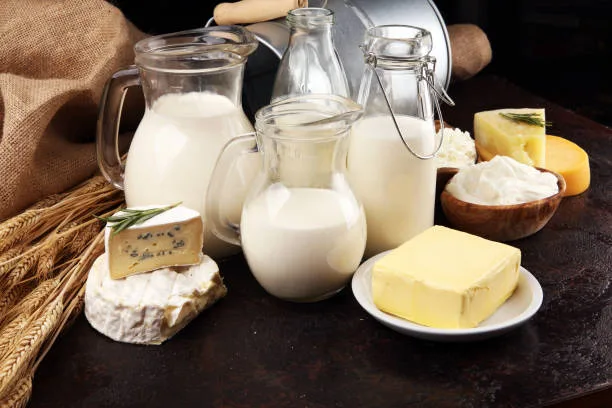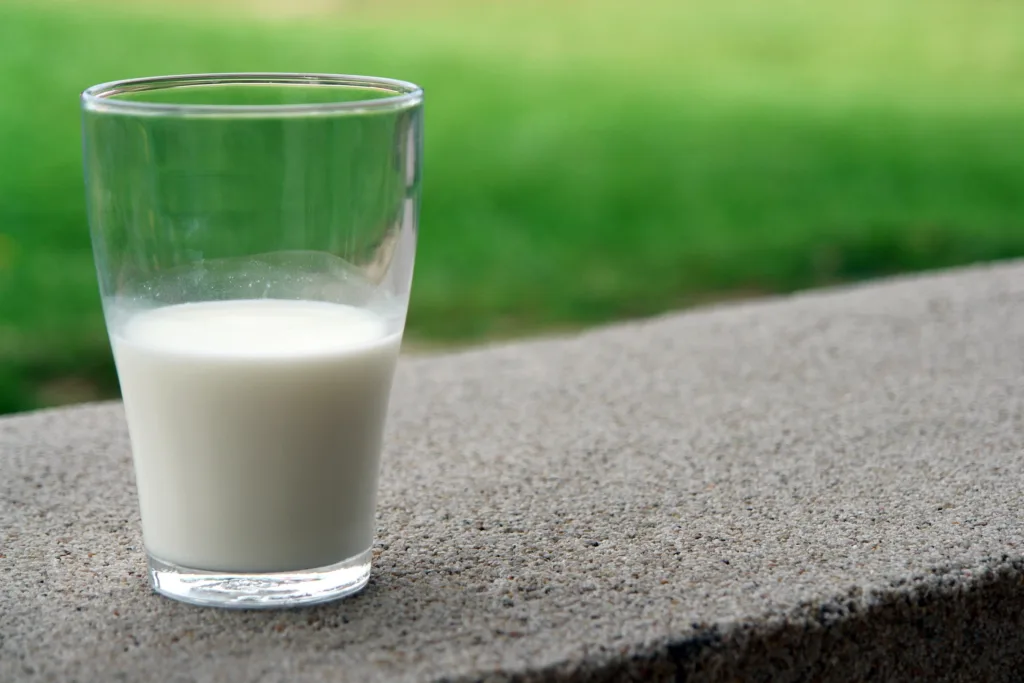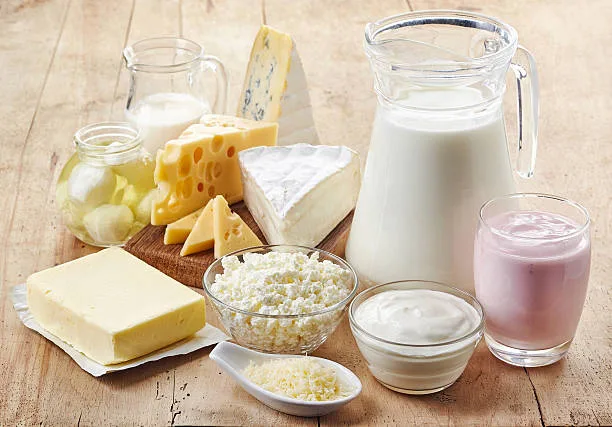Eating a balanced diet is crucial for sustainable and healthy weight loss. However, there’s a common misconception that dairy products like milk, yogurt and cheese lead to weight gain. Contrary to this belief, incorporating dairy into your diet can actually promote weight loss! Dairy contains key nutrients that support appetite control, fat metabolism and gut health – all of which are important factors for shedding excess pounds. Let’s explore the science behind why dairy is a dynamic duo for effective weight management.
The Protein-Packed Powerhouse: Dairy’s Impact on Appetite Control
Protein is a superstar when it comes to keeping hunger at bay. Foods rich in protein take longer to digest, which keeps you feeling fuller for longer after eating. This results in lower overall calorie intake throughout the day. Multiple studies show that increasing protein intake to 25-30% of total daily calories can boost weight loss by up to 80% compared to lower protein diets.
Dairy products are excellent sources of satiating protein. An 8-ounce glass of milk contains 8 grams of protein while a 6-ounce container of Greek yogurt provides 15-20 grams. Ounce for ounce, cheese is one of the most protein-dense foods available. Cheddar, mozzarella and Swiss all provide about 7 grams of protein per ounce. The high-quality protein in dairy has a powerful impact on appetite regulation.
In one study, women who had milk, yogurt or cheese with breakfast reported feeling less hungry before lunch compared to when they ate cereal alone. The addition of protein-packed dairy foods helped them effortlessly reduce their calorie intake later in the day. Another trial found that subjects who ate yogurt as an afternoon snack felt fuller and ate dinner 100 calories earlier than those who snacked on chocolate or crackers instead. The yogurt improved satiety due to its stellar protein content.
Research also demonstrates that eating yogurt as part of a reduced-calorie diet enhances fat loss. In one study, subjects who combined yogurt with their weight loss program lost 61% more fat mass than those who simply cut calories without yogurt. The yogurt group also lost 81% more stomach fat. The researchers attributed the enhanced fat loss to the appetite-regulating effects of yogurt’s protein. The participants effortlessly reduced calories and lost more body fat just by adding protein-rich yogurt to their daily menu.

Calcium and Vitamin D: A Winning Combination for Fat Metabolism
Calcium is a mineral that’s earning recognition for its role in fat metabolism. It appears to influence how the body both stores and breaks down fat. Studies suggest that low calcium intake may spur fat production and inhibit fat breakdown. However, consuming adequate calcium seems to have the opposite effect, supporting a healthy rate of fat oxidation.
For example, one trial found that subjects who consumed low-calcium diets experienced a significant decrease in fat breakdown compared to those eating high-calcium diets. The researchers concluded that low calcium intake disrupts the body’s ability to efficiently utilize stored fat. On the other hand, getting enough calcium encourages fat cells to release stored fat for energy. Since calcium promotes fat loss, it’s not surprising that higher calcium diets are linked to lower body weights. Supplementing with calcium has been shown to modestly increase weight loss in several studies.
Dairy products are the most common source of dietary calcium. Incorporating low-fat varieties like milk and yogurt provides an easy way to obtain weight loss-friendly calcium. Just one cup of milk or yogurt contains 30% of the recommended daily value. Consuming enough calcium-rich dairy is key for optimizing fat metabolism.
Vitamin D also deserves a spot on dairy’s weight loss pedestal. This fat-soluble vitamin aids in calcium absorption for bone health. Interestingly, it also binds to receptors on fat cells and affects how calories are stored and used. Research suggests that low vitamin D levels can undermine weight loss efforts.
For instance, one study found that overweight women who followed a calorie-restricted diet lost significantly more weight when their vitamin D levels were increased to normal through supplementation. On the flip side, getting enough vitamin D may enhance fat breakdown and discourage new fat formation. Adequate vitamin D signals fat cells to burn calories rather than hoard them.
When it comes to vitamin D, the best dairy choices are fortified milk and yogurt as well as cheese and butter. These dairy foods contain both calcium and vitamin D for a potent combination that supports fat metabolism. One study found that subjects with higher vitamin D and calcium intakes lost more abdominal fat and maintained more lean muscle during weight loss compared to those consuming lower amounts of these nutrients.

Probiotics and Gut Health: Dairy’s Impact on Digestion and Weight
Emerging research highlights the importance of gut health for overall wellness, including maintaining a healthy weight. The trillions of bacteria living in your digestive tract heavily influence various bodily processes, including fat storage and metabolism. An imbalance of gut microbes is linked to obesity, insulin resistance and other factors that can impede weight loss.
Probiotics are beneficial strains of live bacteria that can restore harmony to an unbalanced gut microbiome. Yogurt and other fermented dairy foods are excellent sources of probiotics. Studies show that probiotics may encourage weight loss through multiple mechanisms. These friendly microbes help reduce fat absorption, influence hormones related to appetite and body fat, decrease inflammation and even improve gut motility.
Several studies demonstrate that consuming probiotic-rich dairy products like yogurt and kefir can reduce body weight and fat mass. In one study, women on a weight loss diet who consumed yogurt containing probiotics lost significantly more body fat than those eating plain yogurt with no probiotics. The probiotic yogurt group also continued to lose weight during the maintenance phase while the plain yogurt group plateaued.
In another trial, overweight adults who consumed a fermented milk product with probiotics for 12 weeks experienced a 4% decrease in body fat compared to the control group who did not consume probiotics. Other studies show that probiotic dairy can reduce belly fat while also lowering inflammatory markers in people with obesity. Improving gut health with probiotic-containing dairy foods may be an effective adjunct for weight management.

Smart Dairy Choices: Navigating Low-Fat and Full-Fat Options
When it comes to dairy, should we choose low-fat or full-fat for weight loss? The answer isn’t black and white. Low-fat dairy gets the green light for fat loss for several reasons. First, it simply contains fewer calories per serving compared to full-fat options. Low-fat milk, yogurt and cheese can easily fit into the daily calorie budget of a weight loss diet.
Second, reducing fat intake often helps those trying to shed pounds. Low-fat dairy makes it easier to cut back on overall dietary fat compared to full-fat varieties. However, full-fat dairy foods have a place in a balanced diet too. They provide vitamins A and D, which are only found naturally in the milk fat. Full-fat dairy also causes blood sugar to rise more gradually than low-fat versions.
For weight loss, full-fat dairy can be incorporated in moderation by budgeting for the extra calories or reducing other high-fat foods in the diet. The key is choosing the low or full-fat options that align with your calorie, fat and nutrient needs. Combining both varieties can help you obtain the array of proteins, fatty acids and micronutrients that dairy products provide.
When choosing full-fat dairy, emphasize yogurt and cheese over butter and cream. The conjugated linoleic acid in yogurt and cheese may help reduce body fat. One study found that people with obesity lost more weight on a calorie-controlled diet that included cheese snacks compared to those who ate carb-heavy snacks. The cheese improved satiety and supported fat metabolism.
Overall, the most weight loss-friendly dairy options are non-fat and low-fat milk, plain Greek yogurt and low-fat cottage cheese. These provide plenty of protein, calcium and probiotics without too many calories or fat grams. However, integrating measured portions of full-fat dairy can also fit into a solid weight loss plan.
Conclusion
Research clearly demonstrates that dairy has several benefits for weight management. The protein, calcium and probiotics in dairy regulate appetite, improve digestion, influence fat storage and increase fat breakdown. When it comes to dairy, focus on low or full-fat options that fit into your overall calorie intake. Be sure to include a variety of dairy products to obtain different fatty acids, proteins and micronutrients for optimal health. Dairy is truly a dynamic duo that contributes to effective, lasting weight loss.
Encouragement and Call-to-Action
We hope this post has provided helpful insights into how you can incorporate dairy into your own weight loss journey. Please subscribe to our newsletter below for more science-based tips on diet, health and nutrition straight to your inbox. We offer free 10-minute consultations for personalized guidance on achieving your health and wellness goals based on availability in my schedule. Check out our other in-depth posts below for more information on eating well for weight loss and nourishment. Thank you for reading!
Thank you for reading this post, don't forget to subscribe to our free newsletter
!
